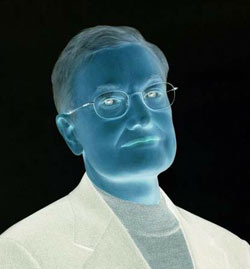
Roger Ebert. He's a film critic of the people and a fan of good movies. He watches a lot of them, and he writes with enviable energy. He's also firmly in touch with the mainstream even as he keeps a toe or two invested in more adventurous films. So his list seems like a fine place to begin.
This year, instead of ranking ten films sequentially he chose to identify twenty features, five documentaries, and one special jury prize, sorting each group alphabetically. Another reason his list is a good place to start is that I've seen all of these films. First, take a look at his list and read his remarks.
He chose the following features (listed alphabetically):
- Ballast
- The Band's Visit
- Che
- Chop Shop
- The Dark Knight
- Doubt
- The Fall
- Frost/Nixon
- Frozen River
- Happy-Go-Lucky
- Iron Man
- Milk
- Rachel Getting Married
- The Reader
- Revolutionary Road
- Shotgun Stories
- Slumdog Millionaire
- Synecdoche, New York
- W.
- WALL-E
His Special Jury Prize goes to
- My Winnipeg
And he singles out five documentaries (listed alphabetically):
- Encounters at the End of the World
- I.O.U.S.A.
- Man on Wire
- Standard Operating Procedure
- Trouble the Water
First, there are a good many decent films in this list, but I wonder if it reflects the year as a whole: many good films but very few greats, a mediocre year on balance.
And if there is a trend toward the middle, I think it may happen at both ends of the spectrum. As I put tick marks next to the films that I don't care for -- Che, Chop Shop, The Fall, Frozen River, I.O.U.S.A. -- I find that I can't get particularly angry about any of them. Each has its merits. Each runs circles around some of the summertime dreck that Hollywood put into multiplexes.

Che is Soderbergh being long, slow, formal, and serious; I just wish I was able to draw more from his portrait of Guevara. Chop Shop is the kind of raw American filmmaking that I normally champion, although in this case the people and milieu seem entirely in service of the story and film rather than the other way around. The Fall is visually stunning and occasionally funny, but every time the color-coded characters reset, I have a little less enthusiasm for their ensuing antics. Frozen River has a nice central metaphor -- a river that can be driven across until it can't -- and a strong performance from Melissa Leo, but the rest is bland and false, like the worst of the Sundance-bound and -spawned dramas. (Naturally, Frozen River was the winner of the Sundance dramatic prize almost a year ago.) I.O.U.S.A. is easily the most entertaining film I've ever seen about U.S. fiscal policy, but the funniest parts are just clips from Saturday Night Live, The Daily Show, and The Colbert Report, and I question its myopic, alarmist-but-folksy view of the mounting national debt, especially since I don't feel like I learned much.
But, yes, even those, my least favorites from Ebert's list, have their merits, and I can't fault anyone for making the case for any one of them. Chop Shop in particular has enough fans that I'll likely watch it again at some point.
This year I find that I'm conflicted about many of the movies that I actually like, more of them than usual. Guy Maddin's films are almost always a treat, but My Winnipeg feels easier, simpler than most of them. The same is true for Werner Herzog's Encounters at the End of the World. But these two filmmakers are always worth a look for their peculiarities alone, even when they're coasting. WALL-E is wonderful in comparison to other children's animated films, and I particularly liked the nearly dialogue-free first half and the overarching concept, but the chase sequences that make up the action climax are among the least captivating in the Pixar catalog, and after the nice opening they feel like an unfortunate, almost cynical capitulation to the norm. Standard Operating Procedure is a mixed bag for so many reasons that we had to discuss them over two episodes of our podcast and talk to Errol Morris himself. Slumdog Millionaire is good percussive fun, but the applause from people who are eager to find a crowd-pleaser that's also worthy of high awards (the Holy Grail of some film journalism) strikes me as odd; my colleague Mr. Parks was more than a little put off by the simplistic view of India.
Shotgun Stories is a promising debut in the vein that David Gordon Green has recently abandoned. (Green executive produced.) But, as with WALL-E, it was the quiet first half that I most enjoyed; the downward spiral of tit-for-tat violence in the second half put me to sleep, and it felt like the filmmaker perceived a need to inject adrenaline and plot into his still life. Did Andrew Stanton and the focus groups at Pixar feel the same about WALL-E?
The Reader and Revolutionary Road are year-end Oscar bait that I find too flawed or uninteresting to discuss today. However, they'll appear on other lists, so I will weigh in shortly -- and, true, I liked aspects of both. (For starters, who can turn away from a double dose of Kate Winslet?) Ditto Synecdoche, New York, but I'm surely not alone; Charlie Kaufman's goal may simply be to wear us all out. I've weighed in on Oliver Stone's W. already, and I've thought very little about it since.
Man on Wire and Trouble the Water are strong retellings of amazing stories -- and they're worth seeking out for that reason alone -- but as cinema they're just serviceable. Sometimes that's all it takes to tell a good story, but I always hope that documentarians will make use of the full range of tools that the medium offers; few do.
I'll have more to say about Milk shortly, but as someone who generally hates biopics, I found it quite moving, against my better judgement. The pejorative that you'll hear is that it's "conventional," but genre conventions are bad only if they imply a similar design of the universe; otherwise, they're just scaffolding. Frost/Nixon is entirely watchable, even suspenseful, and even though Karina Longworth's offhand comment was stuck in my head -- she observed that Frank Langella talks like a Muppet in the trailer -- I thought he was very good at playing a complicated person. I wish I'd have seen him on stage. But the film is mostly about Underdog David Frost who goes to battle against some big-name personality whose quirks and identity are the movie's accents and textures, not its substance. The order of the surnames in the title is accurate, but the filmmakers could probably have taken a tip from Stallone and gone with simply Frost. Trouble is, that might have attracted the wrong audience for this near-Christmas release.
Moving up the food chain we come to Happy-Go-Lucky, one of my real surprises this year. Mike Leigh is an established filmmaker who regularly turns in Quality Pictures, capital Q, capital P, that for some reason don't connect with me. I see them, I like them, I go away essentially unchanged. Given the opportunity to see his latest in Toronto, I passed, knowing that I could just see it later. Or not. Whatever.
But then I did see it, and although it has a list of ingredients that should give me a case of the vomits -- a perpetually one-lining happy-go-lucky woman, her mean-as-dirt, racist driving instructor, her sweet-as-cherry pie, good-lookin' colleague (a social worker!) -- Leigh also engineers such deliberate juxtapositions of personalities that I found it quite often fascinating. A flamenco instructor appears and exhibits so much passion and fire that she not only sidelines our happy heroine, she'd have knocked the wind out of Penelope Cruz were the poor actress to set foot in the dance studio. Stand back. That sort of meeting occurs over and over -- from beginning to end -- and I actually went back to see the film a second time to watch the various matches between unstoppable objects and immovable walls. It's not perfect. A few moments come close to lessons and speechifying, but even those I'm not so sure fall into the trap. Certainly, if nothing else, the film has given me a new interest in Mike Leigh. Perhaps I'll track down Naked -- his most praised film -- after all.
I found the Israeli film The Band's Visit, one of the few foreign films on Ebert's list, surprisingly delightful. Surprising because I thought I had it pegged in the first few minutes as a droll, twee, manufactured-for-import clone of Aki Kaurismäki. But it's actually a nicely observed collection of vignettes. Super-short stories, really, and not all of them comical. It reminds me of early MiloÅ¡ Foreman, just a bit. It probably won't land near the top of my list, but I enjoyed it enough that I wouldn't mind to watch it again.
I'll go on record as saying that in a summer overfilled with comic book movies -- some of which are the worst pieces of junk I ever care to see in a theater -- two can hold their heads high even in non-comic company: Iron Man and The Dark Knight. I may have said in a review that The Dark Knight was the better, more serious film, but I have to admit that Iron Man is holding its own in my memory. Sometimes sticking to the genre can be as good as trying to dissect it within the confines of a Hollywood blockbuster. I couldn't care less about the big animated iron men duking it out in the street, but I liked nearly every line uttered by Robert Downey Jr., and I clearly remember the final seconds of the film, which tends to speak well of a movie's lasting impression. At least it does for me. Like the best parts of Iron Man, those last few seconds belong to Downey, Jr.
Finally, Ebert's list includes three films that I can embrace whole-heartedly without reservation. Ballast, Doubt, and Rachel Getting Married. They're contenders for my list as well.



